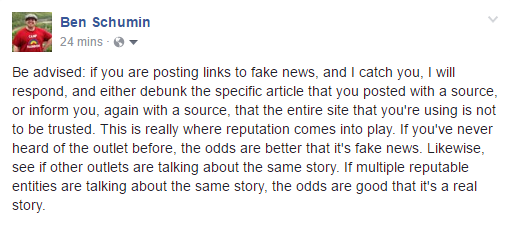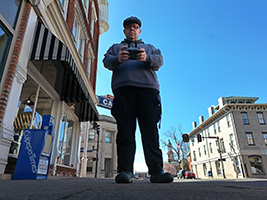I think that we need to have a discussion about news sources…
4 minute read
February 27, 2017, 9:14 AM
Over the course of the last several days, whenever I’ve gone on Facebook, I feel as though I’ve had to play fact-checker a lot more than usual. Most of the stories that I’ve had to verify and debunk are about Donald Trump, but there have also been a few ones about the toxin-du-jour and other miscellaneous topics. And having to constantly stay on my game and do the same sort of research over and over again gets tiring. I started out making this post about the problem:

This post got eight likes and one comment, so it didn’t do as well as I would have hoped. Maybe it’s because I posted it in the middle of the day on a Friday. But in any case, the bottom line is to think before you share.
Then two days later, I posted again, taking things a step further:

This second post generated more reactions and more discussion. But note that nothing about this is a new practice on my part. I’ve always debunked the fake stories as I’ve found them. It’s just been a lot more recently. Nonetheless, it’s like Randi Rhodes has said many times: you’re entitled to your own opinion, but you’re not entitled to your own facts.
Remember that anyone can buy a domain name and make a website, and they can say whatever they want on that website. I know, because I do it myself on here. I pay for the domain and the hosting, and then I can go and say whatever I want on here. No one is going to stop me from saying whatever I please on here. However, when I talk about stuff, I try to link to my sources whenever possible. But I don’t call my site news. I consider my site to be opinion and entertainment – not “news” by any means.
The bottom line here is that it is incumbent upon you, the consumer of media, to do your homework and vet your sources. A quick Google search will typically suffice. They say that extraordinary claims require extraordinary evidence, and fake news stories typically don’t stand up to scrutiny once the claims are googled. That said, I love Snopes.com for this. They do an extraordinary job of vetting various claims made about things, and have been doing so since the mid 1990s. So if you’re googling a claim and Snopes comes up, read it, because it probably will conclusively answer whether the claim that you’re reading is real or fake.
Another thing to look at is whether or not the claims in an article are repeated anywhere else, particularly by a more reputable news organization. If you don’t find the same story written about by other organizations on a subject where you would expect something of that nature to get very wide coverage, then you may want to take the story with a grain of salt, i.e. it’s probably fake. If I see several outlets reporting similar stories, then there’s a good likelihood that the story is legitimate.
Then there are also sites that make it their business to vet these various “news” sites. One site that I’ve found helpful in this area is Media Bias/Fact Checking. They vet sites based on wording, sourcing, story choices, and political affiliation. Generally, you can run a site claiming to be news through there, and they will likely have a page about it. They also publish lists of sites by bias, including questionable sources. Then there’s also Real or Satire?, where you submit an article, and they tell you how it stacks up as far as reliability.
It also seems worthwhile to draw a line between satire and fake news. Satire sites, such as The Onion or The Borowitz Report, may look like news at first glance, but they make no bones about the fact that they aren’t real stories. It’s humor to make a point, and this is known from the outset, and a mark of good satire is that the subject matter seems plausible. Fake news, on the other hand, is trying to mislead you into thinking that it’s actually news, and while some of it is so ridiculous that it can be dismissed out of hand, some of it can have real world consequences, as in the case of the “Pizzagate” conspiracy theory, which led to a random nutjob firing shots into a local pizzeria in DC.
And lastly, it’s up to you to do your own research on the trustworthiness of sites. Always do your own research, because you need to fully understand what you’re reading, and come to an understanding on the trustworthiness of your sources. Others may help by pointing you towards resources that indicate the trustworthiness of a source, but ultimately, it’s your own responsibility to be informed. That also means not trusting Donald Trump or the White House when it comes to determining fake news, because their definition of “fake news” is any negative coverage of them or anything that they disagree with.
In any case, I want everyone to be well-informed, and that doesn’t come easily. Do your research, people…
Categories: News, Social media










And one more thing that I thought about after the entry was written: if an article is reporting on another article, read the article that the article is referring to. After all, why read a secondhand article, when you can read the original?